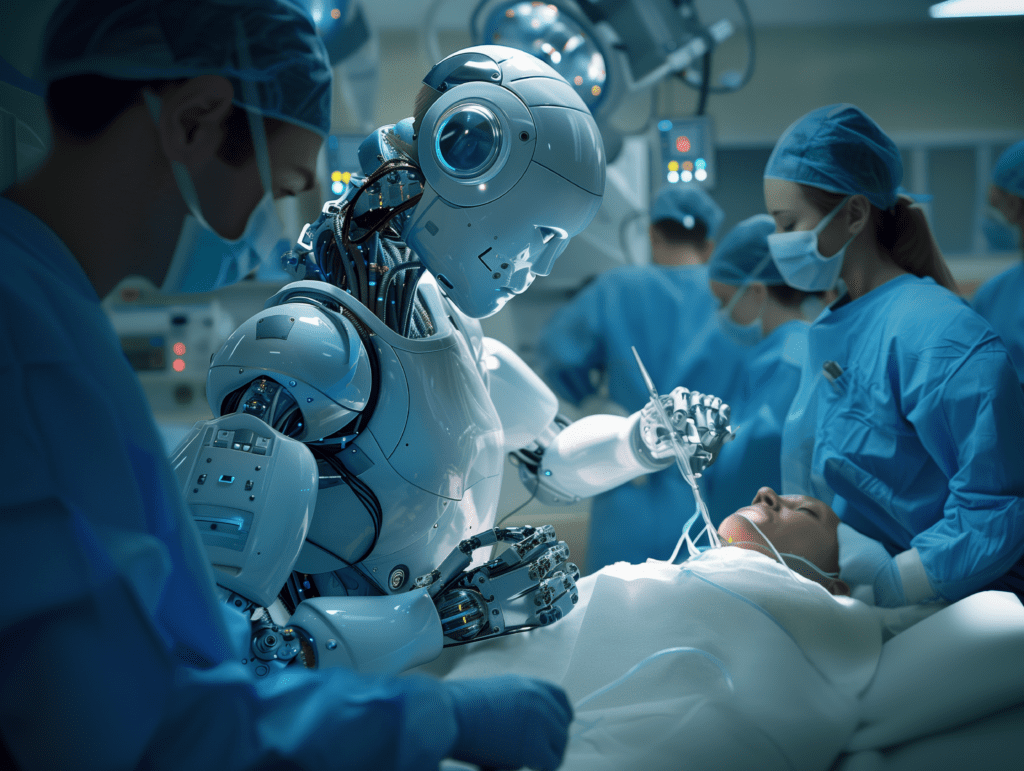AI in Healthcare: Revolutionizing Medicine and Patient Care

Artificial intelligence (AI) is making remarkable strides across industries, and healthcare is no exception. With its ability to process vast amounts of data, recognize patterns, and provide insights, AI is transforming how medical professionals diagnose, treat, and manage patient care. In this blog, we will explore how AI is revolutionizing healthcare, from improving diagnostic accuracy to enhancing personalized treatment plans, and its potential to streamline medical processes.
The Role of AI in Diagnostics
One of the most significant applications of AI in healthcare is in medical diagnostics. AI-powered systems are being trained to analyze medical images, such as X-rays, MRIs, and CT scans, with incredible accuracy. Machine learning algorithms can detect early signs of diseases like cancer, heart disease, and neurological disorders, often identifying issues that human eyes might miss.
For example, AI has been instrumental in detecting breast cancer from mammograms. Deep learning models are now able to spot patterns in mammograms that might indicate cancerous growth, sometimes even before symptoms appear. AI can also analyze data from medical records, helping doctors identify at-risk patients early and take preventive measures.
Improving Personalized Medicine
Personalized medicine, which tailors treatment plans to individual patients, is becoming a reality thanks to AI. With access to a patient’s genetic information, lifestyle choices, and environmental factors, AI systems can suggest the most effective treatments. This precision medicine approach ensures that patients receive therapies that are most likely to work for their unique genetic makeup, rather than a one-size-fits-all approach.
AI also plays a crucial role in pharmacogenomics, where it helps in predicting how a patient’s body will respond to certain medications. By analyzing genetic data, AI can guide doctors in choosing the most effective drug, reducing adverse drug reactions, and ensuring better patient outcomes.
AI and Remote Patient Monitoring
AI is making it possible to monitor patients outside traditional healthcare settings. Wearable devices, such as smartwatches and fitness trackers, are equipped with sensors that collect real-time data on vital signs like heart rate, blood pressure, and blood oxygen levels. AI can analyze this data to detect any abnormalities or early warning signs of conditions such as heart attacks, strokes, or diabetes.
Through continuous monitoring, AI-powered tools help doctors provide ongoing care and make informed decisions without needing the patient to visit a clinic regularly. This is especially valuable for elderly patients or those with chronic conditions who require constant supervision but might find frequent visits to healthcare facilities difficult.
AI in Drug Discovery
One of the most exciting developments in AI is its application in drug discovery. The process of developing new drugs is traditionally long, expensive, and complex, taking years to bring a new medication to market. AI, however, is accelerating this process by analyzing vast datasets of biological information, identifying potential drug candidates, and predicting how they will interact with the human body.
AI models can simulate how different compounds will behave, predict side effects, and identify new therapeutic targets, all of which significantly reduce the time and cost involved in drug development. This technology is proving particularly valuable in the search for treatments for complex diseases like cancer, Alzheimer’s, and rare genetic disorders.
Enhancing Patient Engagement and Care Coordination
AI is also improving the patient experience by streamlining administrative tasks and enhancing communication between patients and healthcare providers. Virtual assistants, powered by AI, can handle appointment scheduling, answer patient queries, and even assist in basic symptom checking. These AI tools help reduce the burden on medical staff, allowing them to focus more on patient care.
In terms of care coordination, AI can aggregate patient data from different sources, such as electronic health records (EHRs), test results, and consultations, to create comprehensive health profiles. This helps doctors make more informed decisions and ensure that patients receive appropriate care without unnecessary duplication of tests or procedures.
AI in Surgery and Robotic-Assisted Procedures
AI’s role in surgery is another area that is seeing rapid innovation. AI-driven robotic systems are now used to assist surgeons in performing complex procedures with greater precision and minimal invasiveness. These systems use AI to analyze real-time data during surgery, ensuring accuracy and optimizing the surgeon’s movements.
Robotic systems also allow for minimally invasive procedures, which reduce recovery times, minimize scarring, and lower the risk of complications. As AI continues to advance, we may see even more sophisticated robotic systems capable of performing surgeries autonomously, further improving surgical outcomes.
Overcoming Challenges and Ethical Considerations
While the benefits of AI in healthcare are vast, there are still several challenges that need to be addressed.Healthcare data is highly sensitive, and ensuring that AI systems adhere to strict privacy standards is crucial. There must be safeguards in place to protect patient information from breaches or misuse.
Additionally, there are ethical considerations around the use of AI in decision-making. While AI can analyze data and make recommendations, healthcare professionals must always be the final decision-makers, ensuring that human judgment is incorporated into treatment plans. The potential for AI bias is also a concern, as algorithms trained on incomplete or biased data can lead to skewed results that may disproportionately affect certain populations.
The Future of AI in Healthcare
As AI technology continues to evolve, its potential in healthcare is limitless. Future advancements could bring about even more personalized treatments, real-time health monitoring, and faster drug discovery processes. The integration of AI into healthcare systems worldwide could lead to more efficient, accessible, and affordable care for patients, particularly in underserved regions where medical professionals and resources are limited.
Moreover, AI could play a key role in addressing global health challenges, such as pandemics, by analyzing vast amounts of data to predict outbreaks, track the spread of diseases, and identify the most effective response strategies.
Conclusion
AI is undoubtedly transforming healthcare in profound ways, from improving diagnostic accuracy to enhancing patient care. As technology advances, we can expect even more innovations that will reshape how we approach health and medicine. However, it is essential to continue addressing the challenges, particularly in terms of privacy, ethics, and ensuring equitable access to these groundbreaking technologies. With proper regulation and oversight, AI has the potential to revolutionize healthcare, making it more efficient, personalized, and accessible for people around the world.




